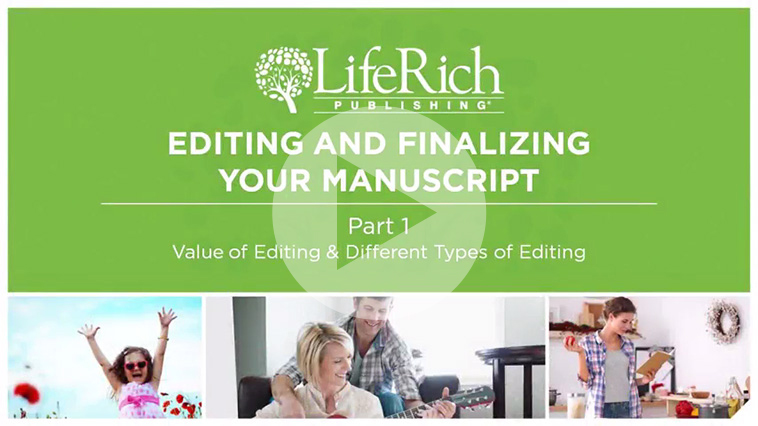Module 3: Writing
Polishing Your Work
Join Andrea Levitt from Reader's Digest as she introduces a lesson on gathering feedback and applying it to your draft. You'll learn about the different ways that you can receive honest and helpful critiques of your writing. You don't want to wait until your book is published to ask for someone else's opinion, so take the opportunity to make your work the best it can be.
Video Transcript
Hi, I'm Andrea from Reader's Digest Select Editions. I'm excited to be here today to introduce you to the webinar, "Polishing Your Work." In "Polishing your Work," we'll talk about different ways you can gather feedback before starting your next draft. Feedback is an invaluable tool to make your book the best it can be. We'll also discuss the best ways to use a writing group, the benefits of joining one and what you should look for in finding a group. Finally, we'll go through some tips on how to start your next draft using the feedback you've gotten and focusing on the big picture issues first. So let's get started.
Now that you have completed your first draft, it's time to start polishing your work, but where to begin? Reworking your first draft can seem like an overwhelming task. Writing your first draft is a huge accomplishment, but there's always room for improvement. The next phase is reworking and rewriting the second draft. This is where things really start to take shape. You don't need to jump into writing your second draft right away. In fact, it's best if you take a little break from your work. It will help you look at your manuscript with a renewed enthusiasm and a fresh perspective. But that doesn't mean you put it aside for two months. Keep your momentum going and make use of the time away from your work. While you're cooling off, you can work on gaining feedback.
Don't wait until your book is published to hear what people think of your work. Receiving feedback on your book while it's still in draft form provides a much-needed outside perspective. It points out areas to explore, descriptions to clarify and plot holes to fill. If you work best with one trusted partner to share your writing journey, you can find a writing partner in various ways. These include writing classes, writing organizations and writer forums. Or you can post a request on Facebook, Twitter or a blog. Some writers work better in a group environment. You can find a writers group, also known as a critique group, in a similar manner as finding a writing partner.
Many writers find expert critiques at writing conferences and writing retreats, especially those that have fewer participants and offer more of a one-on-one interaction with faculty. Some conferences offer fee-based critiques from authors and editors. This form of feedback will help you move from a solid first draft to a polished manuscript. You can find a conference or a retreat by searching online. Conferences and retreats often only occur annually, so you may need to travel to find one that works for you.
Most universities and community colleges offer writing classes. Many writing classes feature opportunities for feedback from peers and teachers. One popular writing school is the New School School of Writing in New York City. There's a class for every level of writer from beginning to seasoned veteran. Make sure that you fully understand the extent of any class before signing up. Some classes don't present critique opportunities. However, any writing class may introduce you to other writers who may be interested in critiquing your work.
Another valuable feedback resource comes from editors. These professionals can be found in a number of ways. Many companies offer fee-based editorial feedback. You can also find reputable editors through organizations like the Editorial Freelance Association. Editorial feedback brings expert advice to your work, but it can be expensive.
You can also find valuable feedback through online groups, or try a Facebook group or forum, like Absolute Write Water Cooler, writing forums or creative writing forums. This feedback avenue is convenient, but it tends to be more time-intensive.
Many writers turn to friends and family for feedback. Friends and family can offer you feedback that is valuable in terms of reader-on-the-street reactions, but be aware that all writers also need professional feedback. Another downfall to friends and family offering feedback is they may not be completely honest. They would be more sensitive to your feelings and may have trouble giving feedback that isn't positive in all respects.
A writing group meets on a regular basis to critique and discuss each other's work. Groups exist in-person or online. Writers' groups are a great way to get feedback on your work. You need honesty, insights and guidance that can only come from an outside perspective. Writers are often too close to their own works to provide honest feedback. A writers' group is the perfect opportunity to test your story. You can actually get instant comments on the feedback you receive. A healthy discussion between group members will quickly reveal which advice you should take and which you should just leave. An added bonus is that most writers' groups are free, so even if you can't afford to pay for an editor to look at your work, you can still receive valuable feedback from your peers. Another benefit of writers' groups is that you can learn from others. There may be writers in your group who are more experienced than you or have a different area of expertise. Listen to their perspectives and learn from them to avoid falling into the problems they've already experienced.
Your first draft is just the beginning. Now that you have something to work with, you can refine your book until you're satisfied. So where do you begin? First, start with the big things. Don't get caught up on the details of editing or grammar on your second draft. Look at the big picture. Know that you will have many drafts, so you don't need to take on everything in the second draft. Pick something to focus on in each one. Perhaps you focus on character development in your second draft. In your next draft, focus on every scene and make sure there's conflict and tension present. Use your feedback. Rewriting is about filling in the gaps to make sure people can see what you see in your book. Explain why a character is acting in a certain way or putting in information that makes more sense to the ending. Remember, cutting is an essential part of rewriting. You must be willing to remove large portions of your work. It hurts but is often necessary to improve a book. Finally, consider the placement of scenes in a story. Would a scene make a greater impact at a different point in the story? If you're having trouble with a particular section of your book, don't give up. Cut and rewrite.
That concludes our webinar on "Polishing Your Work." The next webinar is "Editing and Finalizing Your Manuscript," where we'll talk about the value of different kinds of editing. For information about publishing, go to LifeRichPublishing.com for a free publishing guide and a free consultation.


